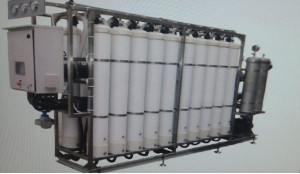UF can be used for removal of particulates and macromolecules from raw water, to produce potable water. It has been used to either replace existing secondary (coagulation, flocculation, sedimentation) and tertiary filtration (sand filtration and chlorination) systems employed in water-treatment plants or as standalone systems in isolated regions with growing populations. When treating water with high suspended solids, UF is often integrated into the process, using primary (screening, flotation and filtration) and some secondary treatments as pre-treatment stages. Ultra filtration processes are preferred over traditional treatment methods for the following reasons:
- No chemicals required (aside from cleaning)
- Constant product quality regardless of feed quality
- Compact plant size
- Capable of exceeding regulatory standards of water quality, achieving 90-100% pathogen removal.
Industries using ultra filtration
Industries that consume large volumes of water or discharge highly toxic effluent are candidates to employ ultra filtration for water reuse.
These include the chemicals, steel, plastics & resins, paper & pulp, pharmaceutical and the food & beverage industries, including soft drinks & canned foods, as well as power, water & wastewater treatment plants and others.


